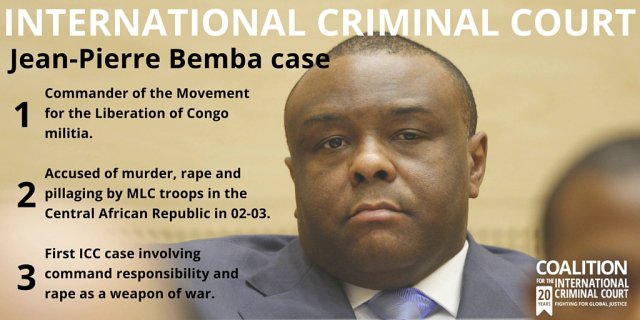By Joyce J Wangui
Rape has remained the un-provable war crime and crime against humanity at the International Criminal Court – until Judges found Congolese warlord Jean-Pierre Bemba guilty this week. Previously, the International Criminal Tribunal for the former Yugoslavia (ICTY) and the International Criminal Tribunal for Rwanda (ICTR) have convicted several people for rape, but the Bemba decision was the first time the ICC was speaking boldly on the matter.
The other two crimes that the former commander of Movement For Liberation of Congo was accused of are murder and pillaging.
In the past, the court has had a slow start in convicting rape criminals, notably in the Bosco Ntaganda and Germain Katanga cases, both from the DRC
“Victims felt terrorised, some contracted HIV after being gang-raped by MLC soldiers,” says Carla Ferstman, director ofREDRESS, a human rights organisation that helps torture survivors obtain justice and reparation says there is urgent need to provide justice and reparations to these victims. She says some were rejected by their families and ostracised by their communities, and many have been left to fend for themselves, without access to basic antiretroviral drugs, psychological or economic support.
In a moving testimony, the court heard how a man, his wife, daughters and granddaughter were all gang-raped by militiamen. In her article titled The Bemba Trial Judgement – A Memorable Day for the Prosecution of Sexual Violence by the ICC, Niamh Hayes highlights the significance of the judgment. “Despite the broad range of sexual and gender-based crimes contained in the Rome Statute, Prosecutor Ocampo’s early failures to pursue evidence-led investigations and tendency to develop the theory of the prosecution case in the abstract led, unsurprisingly, to a very weak record on prosecutions for crimes of sexual violence,” she says. She says when Bensouda took over as prosecutor, the attrition rate for charges of sexual violence at the ICC stood at over 50 per cent, with fewer than half of all such charges successfully confirmed for trial.
“Those figures have improved under her tenure, particularly following the successful confirmation of all sexual and gender-based charges in the Laurent Gbagbo and Bosco Ntaganda confirmation decisions.
She also spearheaded the development of the Office of the Prosecutor’s Policy Paper on Sexual and Gender-Based Crimes, which made some important recommendations about pursuing alternative modes of liability and selecting the most appropriate legal characterisation of the charges based on the evidence,” she says. However, as of Monday 21, Hayes says the ICC had never entered a conviction for crimes of sexual violence.
Eithne Dowds, a PhD researcher at the School of Law at Queen’s University Belfast specialising in the definitional parameters of the crime of rape at the International Criminal Court tells JournalistsFor Justice that as the first conviction before the ICC for crimes of sexual violence as war crimes and crimes against humanity, as well as the first conviction of an individual charged with command responsibility, under Article 28 of the Rome Statute.
“This judgement is extremely important and will go some way in restoring the legitimacy of the ICC in terms of its ability to deliver justice to victims of rape of sexual violence.The judgment sheds light on the different manifestations of the crime of rape which clarified the definitional elements of the crime and provided guidance on their interpretation,” she says.
Another first in this judgement sexual violence against men has been charged as rape, as opposed to being subsumed under another crime such as torture.
Hayes says of significant importance is; that a defendant has been convicted of rape based on the testimony of male victims will mark the Bemba case as one that will go down in history as a vital precedent on that basis alone, but it also represents a hugely important step in the ICC’s broader efforts to provide greater accountability for sexual violence crimes.
Previous case
The ICC, says Dowds, has had a poor track record in terms of pursuing crimes of sexual violence for example in the Thomas Lubanga case, getting past confirmation of charges and securing convictions like in the Germain Katanga trial. Looking back at the failures of the Katanga case, she notes it only had three witnesses testifying about the sexual violence they had suffered and while the Court believed the testimony of the witnesses, Katanga was charged as an accessory under article 25(3)(d) of the Rome Statute and the Court found that the Prosecution had failed to connect the crimes to him even though he was convicted of directing an attack against a civilian population, pillaging, and destruction of property, as well as murder, suggesting that that a higher standard of evidence is expected in relation to sexual violence.
Dowds points to two significant reasons that the Court was able to convict Bemba; one being the bravery of the 14 prosecution witnesses who testified about rape and other forms of sexual violence committed by the MLC under Bemba’s command and two, the mode of liability as command responsibility under Article 28 of the Rome Statue.
“The second point in particular demonstrates that the Court is getting better at selecting the most appropriate mode of liability to secure convictions and also that it may no longer be the case that a higher standard of evidence is expected in relation to sexual violence,” she says.
Will the verdict act as a deterrent for sexual violence perpetrators? David Donat Cattin of the Parliamentarians for Global Action (PGA) based in New York certainly thinks so. “Bearing in mind that what deters crimes is the certain enforcement of the law, not the years of jail of the sentence. He adds that the fact that Bemba is rich, the sentence on reparations for the benefit of victims/survivors may also have an additional deterrence effect.







